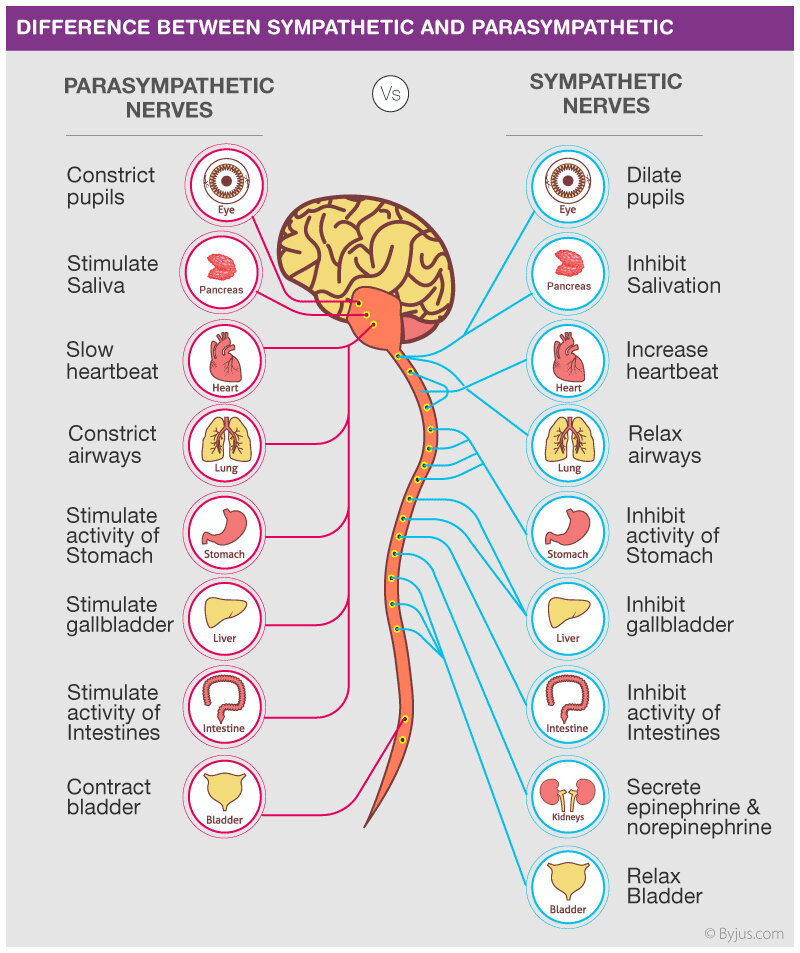Your body’s autonomic nervous system, which controls all the involuntary bodily functions such as breathing and digestion, is divided into three parts. Two of them are the Sympathetic Nervous System (SNS) and the Parasympathetic Nervous System (PNS). The SNS is responsible for executing the “fight or flight” response in your body, which is triggered in situations that you perceive as being harmful to you. The PNS, on the other hand, controls the “rest and digest” response.
The fight or flight response
Your SNS is activated as a response to physical or mental stress, and causes the following reactions in your body:
Increased blood pressure
Increased flow of blood to lungs, muscles, and other body parts necessary to run away from danger
Decreased blood flow to the reproductive and digestive systems
Stress hormones such as cortisol are released to make us stronger, and adrenaline is released to make us faster
Increased and faster release of glucose into the system for instant energy
The rest and digest response
Your PNS is usually activated as a response to pleasure or after a meal and causes reactions opposite to the fight or flight response, such as:
Lowered blood pressure
Slower respiration and heart rate
More intestinal activity
Increased blood flow to the digestive system
Neurotransmitters such as acetylcholine are released which control muscle contractions including that of the cardiac muscles
Decreased release of stress hormones
Effects of excess SNS activity
The sympathetic and parasympathetic nervous systems need to balance each other. After a period of severe SNS activity which releases stress hormones and increases the blood pressure and sugar, the body must get a period of relaxation to trigger PNS activity that lowers the blood pressure and sugar, along with lowering the stress hormones. When both systems are out of balance, it could lead to the following physical diseases:
Cardiovascular diseases – chronic SNS activity changes the organization as well as shape and size of the blood vessels.
Type 2 diabetes – severely elevated blood sugar levels can lead to insulin resistance and type 2 diabetes.
Obesity – high levels of SNS activity can lead to obesity.
Weak immune system – Excess SNS activity can weaken the body’s immune system and its balance as high levels of cortisol suppress the immune function.
Kidney diseases – excess SNS activity disrupts the balance of sodium and water levels, which leads to increased blood pressure and eventually kidney problems.
Mood imbalances and poor sleep – an underactive PNS can lead to mood imbalances and disorders such as depression and anxiety. An overactive SNS can lead to poor sleep, which in turn leads to more stress causing more SNS activity like a vicious cycle!
You’re not alone!
Many people experience chronic stress, but you can combat it by visiting a therapist or counselor. If you reside in the Tampa area, book your therapy or counseling appointment with Therapycts today to get excellent support and find your inner balance easily!
NEED HELP?
Collaborative Therapeutic Services (CTS) wants to help. We offer a variety of counselling and therapy services, hours, and service providers with diverse specializations. We offer evening & weekend appointments in office or by TeleHealth conferencing.
Have questions? Contact Us Here or Call 813-951-7346. Located in Tampa, Florida. Ask us about our new NEUROLEASE® TREATMENT THERAPY - A cutting edge treatment for releasing toxic emotions.

